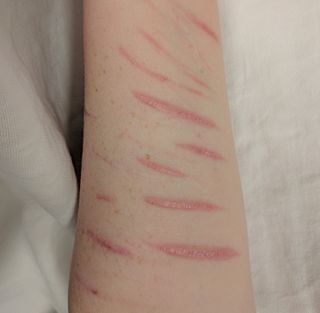Related Research Articles

Self-harm refers to intentional behaviors that cause harm to oneself. This is most commonly regarded as direct injury of one's own skin tissues,commonly with suicidal intention. Other terms such as cutting,self-injury,and self-mutilation have been used for any self-harming behavior regardless of suicidal intent. Common forms of self-harm include damaging the skin with a sharp object or scratching with the fingernails,hitting,or burning. The exact bounds of self-harm are imprecise,but generally exclude tissue damage that occurs as an unintended side-effect of eating disorders or substance abuse,as well as more societally acceptable body modification such as tattoos and piercings.
Preadolescence is a stage of human development following middle childhood and preceding adolescence. It commonly ends with the beginning of puberty. Preadolescence is commonly defined as ages 9–12 ending with the major onset of puberty. It may also be defined as simply the 2-year period before the major onset of puberty. Preadolescence can bring its own challenges and anxieties.

Mental health encompasses emotional,psychological,and social well-being,influencing cognition,perception,and behavior. According to the World Health Organization (WHO),it is a "state of well-being in which the individual realizes his or her abilities,can cope with the normal stresses of life,can work productively and fruitfully,and can contribute to his or her community". It likewise determines how an individual handles stress,interpersonal relationships,and decision-making. Mental health includes subjective well-being,perceived self-efficacy,autonomy,competence,intergenerational dependence,and self-actualization of one's intellectual and emotional potential,among others.
Child and Adolescent Mental Health Services (CAMHS) is the name for care provided by the NHS and other organisations in the United Kingdom for children,generally until school-leaving age,who have difficulties with their emotional well-being or are deemed to have persistent behavioural problems. The service is also known as Children and Young People’s Mental Health Services (CYPMHS). CAMHS offer children,young people and their families access to support for mental health issues from third sector (charity) organisations,school-based counselling,primary care as well as specialist mental health services. The exact services provided may vary,reflecting commissioning and providing arrangements agreed at local level.
Teenage rebellion is a part of social development in adolescents in order for them to develop an identity independent from their parents or family and a capacity for independent decision-making. Teenage rebellion usually begins at around 13 years old,while for some it may start to happen 1-2 years before puberty. It then ends at around 18-24 years old. They may experiment with different roles,behaviors,and ideologies as part of this process of developing an identity. Teenage rebellion has been recognized within psychology as a set of behavioral traits that supersede class,culture,or race;some psychologists,however,have disputed the universality of the phenomenon. According to Terror Management Theory,the child's allegiance to parental authority and worldviews can weaken after the discovery that parents,like themselves and everyone else,are mortal. This realization creates an unconscious need for security that is broader than what the parents alone provide. This can lead to new cultural allegiances,in the search for a more enduring sense of meaning. Teenagers seek to perceive themselves a valued contributor to aspects of culture that more convincingly outlive or transcend the mortal individual's lifespan. However,since the parents also instill their cultural beliefs onto the child,if the child does not come to associate their parents' mortality with their cultural beliefs,the chances of rebellion decrease.

Major depressive disorder,often simply referred to as depression,is a mental disorder characterized by prolonged unhappiness or irritability. It is accompanied by a constellation of somatic and cognitive signs and symptoms such as fatigue,apathy,sleep problems,loss of appetite,loss of engagement,low self-regard/worthlessness,difficulty concentrating or indecisiveness,or recurrent thoughts of death or suicide.
Research has found that attempted suicide rates and suicidal ideation among lesbian,gay,bisexual,transgender and queer (LGBTQ) youth are significantly higher than among the general population.

The effects of climate change on mental health and wellbeing are being documented as the consequences of climate change become more tangible and impactful. This is especially the case for vulnerable populations and those with pre-existing serious mental illness. There are three broad pathways by which these effects can take place:directly,indirectly or via awareness. The direct pathway includes stress-related conditions caused by exposure to extreme weather events. These include post-traumatic stress disorder (PTSD). Scientific studies have linked mental health to several climate-related exposures. These include heat,humidity,rainfall,drought,wildfires and floods. The indirect pathway can be disruption to economic and social activities. An example is when an area of farmland is less able to produce food. The third pathway can be of mere awareness of the climate change threat,even by individuals who are not otherwise affected by it. This especially manifests in the form of anxiety over the quality of life for future generations.
Marjorie Knickerbocker Pyles Honzik was a developmental psychologist known for her longitudinal research on children's mental abilities,behavioral problems,and health outcomes.
Louise Arseneault is a Canadian psychologist and Professor of Developmental Psychology in the Social,Genetic &Developmental Psychiatry Centre in the Institute of Psychiatry,Psychology and Neuroscience at King's College London,where she has taught since 2001.
Adriana Galván is an American psychologist and expert on adolescent brain development. She is a professor of psychology at the University of California,Los Angeles (UCLA) where she directs the Developmental Neuroscience laboratory. She was appointed the Jeffrey Wenzel Term Chair in Behavioral Neuroscience and the Dean of Undergraduate Education at UCLA.
Catharine Sarah Creswell is a British psychologist and Professor of Developmental Clinical Psychology at the University of Oxford. She specialises in anxiety disorders in children and young people.

Betty Jo "BJ" Casey is an American cognitive neuroscientist and expert on adolescent brain development and self control. She is the Christina L. Williams Professor of Neuroscience at Barnard College of Columbia University where she directs the Fundamentals of the Adolescent Brain (FAB) Lab and is an Affiliated Professor of the Justice Collaboratory at Yale Law School,Yale University.
Scyatta A. Wallace is a developmental psychologist who studies how gender,race,and culture impact health outcomes of urban Black youth. In her community-based research and practice,Wallace emphasizes the importance of cultural competence and the need to diversify the workforce in health and mental health professions to better serve ethnic-minority communities. Wallace is an associate professor of psychology with tenure at St. John's University.
Isobel Heyman is a British psychiatrist and consultant at the Great Ormond Street Hospital. She was named as the Royal College of Psychiatrists Psychiatrist of the Year in 2015.

Hyeouk Chris Hahm is an American health services professor and researcher. She is the Associate Dean of Research at Boston University and the first Asian American faculty member to be promoted to full professor at the Boston University School of Social Work and was elected vice president of the Society for Social Work and Research in 2024.
The ongoing youth mental health crisis refers to the significant rise in mental health challenges among adolescents and young adults in the US,Canada,the UK,and Europe. The trend began in the early 2010s and escalated during the COVID-19 pandemic. Notable issues include increasing rates of depression,anxiety,self-harm,and suicide. Girls are particularly vulnerable.

Roz Shafran is a British consultant clinical psychologist who is Professor of Translational Psychology at the UCL Great Ormond Street Institute of Child Health. She is particularly known for her pioneering research on perfectionism and its effects on mental health,as well as her leadership in creating and directing the Charlie Waller Institute.
Amanda M. Fanniff is an American clinical psychologist who is an Associate Professor of Psychology and the Faculty Senate Chair at Palo Alto University's Pacific Graduate School of Psychology. Fanniff is also a clinical psychologist. At Palo Alto University,she is affiliated with the Developmentally Informed Policy and Practice Research Lab. Her research addresses forensic mental health assessment,legal system processing,and the influence of sociocultural identities.
References
- ↑ Barry, Ellen (2024-05-06). "Are We Talking Too Much About Mental Health?". The New York Times. Retrieved 2024-12-01.
- ↑ Demsas, Jerusalem, "Not Everyone Needs to Go to Therapy", The Atlantic, retrieved 2024-12-01
- ↑ Rumbelow, Helen (2024-06-18). "The psychologist who says no, our teens aren't all harmed by social media". The Times . Retrieved 2024-12-01.
- ↑ Barker, Irena (2024-06-12). "Pupil mental health: what works in schools and what doesn't". www.tes.com. Retrieved 2024-12-02.
- ↑ Foulkes, Lucy; Stringaris, Argyris (2023-02-27). "Do no harm: can school mental health interventions cause iatrogenic harm?". BJPsych Bulletin. 47 (5): 267–269. doi:10.1192/bjb.2023.9. ISSN 2056-4694. PMC 10764817 . PMID 36843444.
- ↑ Foulkes, Lucy (2024-10-14). "The problem with mental health awareness". The British Journal of Psychiatry: The Journal of Mental Science. 225 (2): 337–338. doi:10.1192/bjp.2024.106. ISSN 1472-1465. PMID 39399916.
- ↑ Sears, Richard (2023-03-21). "Mental Health Awareness Campaigns May Actually Lead to Increases in Mental Distress". Mad In America. Retrieved 2024-12-02.
- ↑ Foulkes, Lucy; Andrews, Jack L. (2023-04-01). "Are mental health awareness efforts contributing to the rise in reported mental health problems? A call to test the prevalence inflation hypothesis". New Ideas in Psychology. 69: 101010. doi:10.1016/j.newideapsych.2023.101010. ISSN 0732-118X.
- ↑ de Lange, Catherine (2023-09-19). "Why being more open about mental health could be making us feel worse". New Scientist. Retrieved 2024-12-02.
- ↑ Chivers, Tom (2023-04-22). "Your teens should be on the phone". Semafor. Retrieved 2024-12-02.
- ↑ Sutton, Jon (2022-03-18). "'That's not about money, that's about basic respect and compassion'". The British Psychological Society. The Psychologist. Retrieved 2024-12-02.
- ↑ Womersley, Kate (2024-06-30). "Coming of Age: How Adolescence Shapes Us by Lucy Foulkes review – deep dive into the teenage mind". The Guardian. ISSN 0261-3077 . Retrieved 2024-12-01.
- ↑ The Week UK (2024-08-01). "Coming of Age by Lucy Foulkes: 'wise and revelatory' guide to the teenage mind". The Week. Retrieved 2024-12-02.
- ↑ McBain, Sophie (2024-07-10). "Inside the teenage mind". New Statesman. Retrieved 2024-12-02.